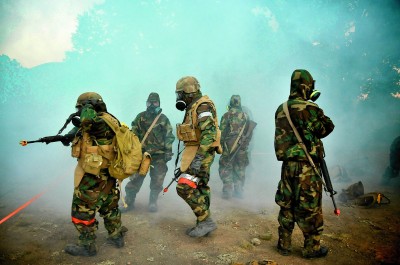US-Russia Clash at Biological Weapons Convention Meeting

Conflict broke out on the floor of the Biological Weapons Convention in Geneva on the third day of the three week long meeting, with the growing division between Russia and her allies on the one hand and the US and hers on the other, evidencing in verbal accusations launched by both sectors.
Russia exerted her “right of reply” to respond to statements made by the US and Sweden which implicated Syrian forces in the use of chemical weapons in that war torn country.
According to the spokesperson for the Russian Federation, such accusations were not only “off topic” at a meeting devoted to biological—not chemical—weapons but were also patently false.

More likely, asserted the Russian spokesman, was that US-affiliated “jihadists” used chlorine gas and attempted to pin this on the embattled Assad regime. The US, he declared, is known to be supporting terrorist groups such as Al Nusra in that region.
I think of this conference at the United Nations as Ground Zero. Every five years, there is a Review Conference of the Biological Weapons in Geneva, Switzerland. For three weeks, delegates from over a hundred and seventy nations meet to discuss the latest advances in biological weapons—whose got ’em, who might have ’em and what to do to protect a vulnerable world from their proliferation and deployment.
It is a fairly low profile meeting, with little press interest and no major movements in international policy. For the fact is that the BWC is virtually the only international arms treaty that has no verification mechanism and no means of ensuring compliance.
However, if one has been following the bio trail, one might come to the conclusion that it is a very hot topic, littered with all kinds of evidence that state parties are failing to comply with the terms of the treaty and may have active biological weapons programs which they are attempting to obscure from international oversight.
One such state party, potentially the most powerful state party in the room, would be the United States of America. And nowhere was the clash of cultures which has split the world into US devotees and US critics more in evidence than in the Convention Hall that Wednesday morning, as US-aligned and non-aligned sectors accused each other of using the Convention for propaganda purposes.
Things might have cooled down after this exchange, as the NGOs were then scheduled to make their brief presentations. As it turned out, most of the NGOs were fairly staid in their presentations, intoning the necessity of making the world safer in face of the increasing threat of biological weapons. A new kid on the block, The International Office for Innovation in Reducing Crime, detailed a strategy to address biorisks while the usual suspects, including UPMC and Vertic, made presentations which highlighted their very public profile as policy analysts.
Some of you may already know that I was also scheduled to present on Wednesday. Representing ITHACA, a grassroots NGO established in 2009 for the purposes of engaging the US on pivotal human rights issues, I had traveled to Geneva to inform the Convention of the wealth of documentation pointing to biological weapons treaty violations by “the leader of the free world.” I made this trip to Geneva not because I believed that the UN would magically step in and correct the situation. Understanding the limitations of the treaty as well as the obvious tilt at the UN in favor of the US, I made this effort because the gravity of the situation demands attention from every possible sector.
My six minute presentation touched on a number of points wherein the bioweapons activity of the US had hit major media and a couple where the media had ignored the story. To read the presentation entire, you may click here.
On leaving the Convention Hall, I was accosted by the presenter from UPMC (even though UPMC is part of a private university and presents itself as civil society, it is rife with “fellows” such as Jen January Thierren, who works at the CDC but received a fellowship from UPMC. Such blurring of lines between government and civil society raises questions about who is leading whom around by the nose). Dr Gigi Gronvall, whose bio reads like a case study in the melding of government with private bioresearch, confronted me with a heated accusation that my presentation was “fact free.”
So I asked her what was not factual. I also mentioned that, as I informed the Convention at the end of my statement, I am available to provide documentation as to the allegations. How could I help her?
She didn’t seem able to provide any input, however (other than a round of name calling). She did say that I said that the live anthrax sent last year to 194 labs worldwide was “intentional.” However, as my presentation reveals, I said no such thing.
Rather, I said that the determination that the problem was the deactivating equipment at Dugway was “nonsensical” due to the fact that the same problem happened eight years prior and nothing was done to fix it.
At that point, Scott Spence from Vertic came storming out and started yelling at me. “We work hard on these issues and you show up every five years and drop a bomb. I am ashamed to be in the same room with you!” His face was red and contorted with anger.
Then he flounced back into the Convention. I guess he didn’t want to take me up on my offer to supply documentation to support my allegations.
Dr. Gronvall then came back from another tack. “What does the deactivating equipment at Dugway have to do with lead in the water in Flint Michigan?” she asked.
“I never said it had anything to do with it,” I replied.
“Well, why did you bring it up?” she demanded.
“I had five minutes to provide a brief overview of non compliance,” I replied. “I was attempting to bring home the message about the vulnerability in the USA’s water systems.”
“Ah ha!!” she cried. “You think the US is non compliant? The US is the good guy here!” she asserted.
“You really believe that?” I said.
“Yes!” (She was yelling now).
“Then I am very sorry for you,” I said, terminating the conversation.
What has become clear through these two events—the war of words between the West and Russia, followed by the outrage generated by my presentation—is that we are not all living in the same world any more. The world has been split into “US aligned” and “US skeptical.” The hologram created to obscure the reality of US aggression,world wide, must be considered side by side with the facts—no WMDs in Iraq, and finger pointing about chemical weapons in Syria that boomerangs back at the accuser.
If the US is becoming more strident and shrill in the war of words then it is apparent that the hologram is breaking apart, as reality keeps asserting itself. What we can conclude here is how important a multi-polar world really is. A landscape which provides multiple perceptions, multiple takes on reality and multiple possible solutions is a world rich in potential. A world only governed by one power, one agenda, is an Orwellian nightmare.
Out of the hundreds of press contacts I made before traveling to Geneva for the BWC, one bore fruit. TASS, the Russian giant news agency, ran an article about our concerns that the US is violating the BWC. Out of the legion of contacts I made with the mainstream Western news agencies, not one picked up the story.
And in case it isn’t quite clear what the story may be, let’s not leave you in a state of confusion. A deliberately caused pandemic, selectively delivered, has the potential of decimating the population of the US, or at least the targeted groups. That would be a holocaust of a different color, one done under the guise of plausible deniability.
If enough people know what is in the works, it becomes more difficult for the dark sleight of hand to strike. It is that simple. The truth can not only set you free—it may just keep you living.
Janet Phelan is an investigative journalist whose articles have appeared in the Los Angeles Times, The San Bernardino County Sentinel, The Santa Monica Daily Press, The Long Beach Press Telegram, Oui Magazine and other regional and national publications. Janet specializes in issues pertaining to legal corruption and addresses the heated subject of adult conservatorship, revealing shocking information about the relationships between courts and shady financial consultants. She also covers issues relating to international bioweapons treaties. Her poetry has been published in Gambit, Libera, Applezaba Review, Nausea One and other magazines. Her first book, The Hitler Poems, was published in 2005. She is also the author of a tell-all book EXILE, (also available as an ebook). She currently resides abroad.

